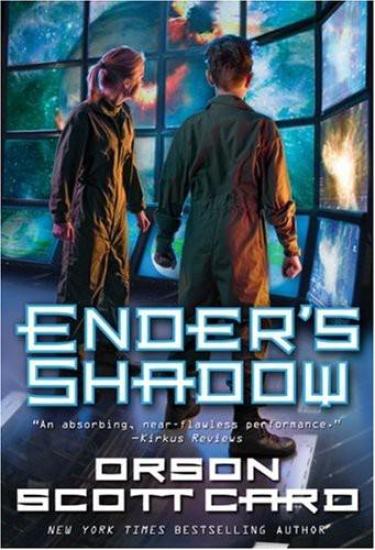
Series: Book 5 in the Ender series
Rating: **
Tags: EN-SciFi, Lang:en
Summary
Ender's Shadow is being dubbed as a parallel novel
to Orson Scott Card's __. By "parallel," Card means that
Shadow begins and ends at roughly the same time as
Game, and it chronicles many of the same events. In
fact, the two books tell an almost identical story of
brilliant children being trained in the orbiting Battle
School to lead humanity's fleets in the final war against
alien invaders known as the Buggers. The most brilliant of
these young recruits is Ender Wiggin, an unparalleled
commander and tactician who can surely defeat the Buggers if
only he can overcome his own inner turmoil. Second among the children is Bean, who becomes Ender's
lieutenant despite the fact that he is the smallest and
youngest of the Battle School students. Bean is the central
character of
Shadow, and we pick up his story when he is just a
2-year-old starving on the streets of a future Rotterdam that
has become a hell on earth. Bean is unnaturally intelligent
for his age, which is the only thing that allows him to
escape--though not unscathed--the streets and eventually end
up in Battle School. Despite his brilliance, however, Bean is
doomed to live his life as an also-ran to the more famous and
in many ways more brilliant Ender. Nonetheless, Bean learns
things that Ender cannot or will not understand, and it falls
to this once pathetic street urchin to carry the weight of a
terrible burden that Ender must not be allowed to know. Although it may seem like
Shadow is merely an attempt by Card to cash in on
the success of his justly famous
Ender's Game, that suspicion will dissipate once you
turn the first few pages of this engrossing novel. It's clear
that Bean has a story worth telling, and that Card (who
started the project with a cowriter but later decided he
wanted it all to himself) is driven to tell it. And though
much of
Ender's Game hinges on a surprise ending that Card
fans are likely well acquainted with,
Shadow manages to capitalize on that same surprise
and even turn the table on readers. In the end, it seems a
shame that
Shadow, like Bean himself, will forever be eclipsed
by the myth of Ender, because this is a novel that can easily
stand on its own. Luckily for readers, Card has left plenty
of room for a sequel, so we may well be seeing more of Bean
in the near future.
--Craig E. Engler
You can't step into the same river twice, but Card has
gracefully dipped twice into the same inkwellAonce for
Ender's Game and again for this stand-alone "parallel novel."
The course readers will follow this time is of the superhuman
child Bean. Raised on streets ruled by starving children's
gangs, he was too weak, at age four, to hold peanuts in his
hand, but ingenious enough to trick the other children into
civilizing themselvesAand to keep himself alive. When his
genius and uncanny understanding of individuals' motivations
are discovered, he is sent to Battle School, where children
learn to command fleets for the war with the alien
BuggersAthe smallest kid ever to do so. Bean is not as
perfect as Ender WigginAhero of the Ender Quartet, begun with
Ender's Game and concluded with Children of the MindAbut he
becomes Ender's ally. Though Bean is cold at first, the kind
of child who weighs the costs of hugging the nun who saved
him from the streets, he wants to understand the respect and
love that Ender wields. Thus, Bean's story is twofold: he
learns to be a soldier, and to be human. Devotees of the
Ender saga will delight in the revelations about the
formation of Ender's Dragon army and about the last of
Ender's games. Though newcomers to the series may miss many
of the novel's points, the wonders of Battle School and
flashsuits and children's armies should keep them turning
pages. As always, everyone will be struck by the power of
Card's children, always more and less than human, perfect yet
struggling, tragic yet hopeful, wondrous and strange. (Sept.)
Amazon.com Review
From Publishers Weekly
Copyright 1999 Reed Business Information, Inc.